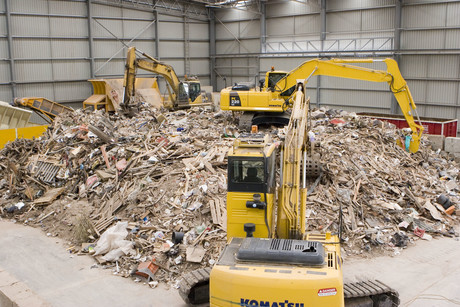Turning waste streams into energy

There has been a major growth phase in processed engineered fuel (PEF) for cement kilns, according to ResourceCo, an international leader in resource recovery and advanced manufacturing.
ResourceCo Alternative Fuels Chief Executive Officer Ben Sawley said the company currently manufactures 250,000 tonnes of alternative fuels annually and there is tremendous opportunity to increase this volume significantly in Australia.
“Fuel diversification of cement kilns is the driver for our customers, as it reduces fuel price risk as well as the kiln’s environmental footprint,” Sawley said.
“Kilns that have introduced an alternative fuel mix among their energy intake have done relatively well in comparison to others that have been locked into purely fossil fuels, particularly in recent months where coal and gas prices have increased significantly.
“We are seeing a turning point in the cement industry in the take-up of alternative fuels and the importance of having diversification in energy.”
ResourceCo has a Joint Venture that supplies an Australian cement manufacturer with nearly 100,000 tonnes per year of processed engineered fuel (PEF) to operate its kiln. This equates to a huge saving in the consumption of traditional fossil fuel usage.
“We are certainly focused on providing an alternative energy use to cement kilns to displace fossil fuels, and while Australia has four cement kilns, we have earmarked Asia as a major area for potential growth,” Sawley said.
“South-East Asia has well over 100 cement kilns and there are countless more across China. Most of these kilns are yet to be tapped into.”
ResourceCo has taken the group’s leading alternative fuel technology directly into the Asian markets and is operating in Malaysia, Singapore and the Philippines.
The company’s state-of-the-art PEF manufacturing plant in Ipoh, Malaysia, has 100,000 tonne-plus capacity and supplies the world’s largest cement manufacturer, amongst others. These partnerships are reducing the reliance on fossil fuels in the production of cement.
Global consumption of PEF at cement kilns is estimated to be around 40 million tonnes per annum, and while high rates of thermal substitution of PEF for fossil fuels is achieved, particularly in Northern Europe, it is relatively easy to produce a 25 to 30% energy substitution.
“Some kilns in northern Europe run at 90% of their energy requirement from alternative fuels, and while this is extremely rare, up to 50% is definitely doable,” Sawley said.
“In South-East Asia, the substitution rate is estimated at less than 5%, so the opportunity is huge regarding what we can do there to turn relevant waste streams into PEF,” he said.
“The advantage of working with cement kilns is that their process naturally removes all pollutants from the combustion emissions and the ash left over is incorporated into the cement product itself. They are the perfect alternative-burning facility. They’re already established, which means you don’t have to build a new specialised facility to take the alternative fuel. All that is required is a feed system and the right blend of PEF to complement the cement facility’s processes.
“Typically, we need to secure a long-term contract with a cement kiln to ensure we can source the fuel to supply them. We can also look at co-investing in the feed system to the cement maker.”
The key to making a PEF business work:
- Secure the back-end and front-end of the supply chain.
- Ensure the raw material streams are suitable to produce the specified fuel.
- Design the processing plant to suit the incoming and outgoing materials.
- Ensure that the fuel is going to be economically and technically suitable for the customer.
PEF can fit in easily with the existing waste supply. The only difference is that waste generators and collectors deliver their suitable waste to the PEF plant rather than landfill.
“The number one competitor to this industry is landfill. We think there is a great opportunity to put more and more waste materials into energy or fuel which can be converted into energy.”
ResourceCo is extending its network in South-East Asia to direct relevant waste streams away from landfill.
“Not only do we have geographic diversification, but we provide a number of options to turn waste streams into PEF by either delivering wastes direct to an established PEF plant, build a PEF plant on a customer’s site and operate it for them, or market PEF produced by a customer to our cement kiln network.”
ResourceCo’s Asia operations also intersect with its subsidiary Tyrecycle, which is claimed to be the biggest recycler of end-of-life (EOL) tyres and conveyor belts in Australia.
Tyrecycle converts rubber waste into quality tyre-derived fuel (TDF) and other value-added products, and has well-developed overseas infrastructure to service direct trading relationships with various cement kiln operators in the region.
How Sydney's OS Passenger Terminal slashed its waste costs
Veolia has delivered a custom-designed solution that cut the Overseas Passenger Terminal's...
Sludge treatment: a weighty issue
Sludge dewatering might not be the most glamorous process, but it is a vital part of ensuring...
Getting closer to a circular economy for plastics
A new process that vaporises hard-to-recycle plastics in order to make recycled plastics has been...









